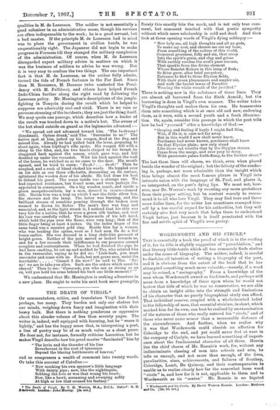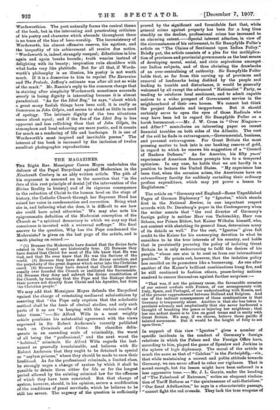WORDSWORTII AND HIS CIRCLE.*
THIS is essentially a book the proof of which is in the reading of it, for its title is slightly suggestive of "parochialism," and that literary tittle-tattle which all too commonly finds shelter under the name of biography. The author, indeed, is careful to disclaim all intention of writing a biography of the poet, and it is obvious from the outset of the book that he has attempted something much more valuable,—namely, if a word may be coined, a " sociography." From a knowledge of the men whom Wordsworth owned as his friends, and perhaps still more from a knowledge of those upon whom be would not bestow that title of which he wits so conservative, we are able to obtain an insight alike into the strength and limitations of his character that no purely biographical study can afford. That individual reserve, coupled with a whole-hearted belief in the fellowship of man, that essential stoicism, in short, which marked him for its own, can best be realised by an examination of the natures of those who really entered his "circle," and of those who never came nearer than a measurable distance of the circumference. And further, when we realise why it was that Wordsworth could cherish an affection for Coleridge to the end, and yet could never feel at ease in the company of Carlyle, we have learned something of import- ance about the fundamental character of all three. Herein lies the chief charm of Mr. Rannie's work, for, without any indiscriminate classing of men into schools and sets, he tells us enough, and not more than enough, of the lives, peculiarities, aims, achievements, and failures of Southey, Coleridge, Lamb, De Quincey, and their contemporaries to enable us to realise clearly how far the somewhat loose word "circle" is, and how far it is not, applicable to them and to Wordsworth as its "centre." Mr. Rannie is no bigoted • Wordsworth and his Circle. By David Watson Bennie. London: Methuen and Co. [12a. 6c1. net.] Wordaworthian. The poet naturally forms the central theme of the book, but in the interesting and penetrating criticism of his poetry and character which abounds throughout there is no trace of the bias of hero-worship. The inconsistency of Wordsworth, his almost offensive reserve, his egotism, and the inequality of his achievement all receive due notice. " Wordsworth is, indeed, strangely unequal; didacticism in him again and again breaks bounds ; truth. wearies . instead of delighting with its beauty; inspiration rubs shoulders with what looks very like platitude. But for all that, if Words- werth's philOsophy is an illusion, his poetry is not worth much. If it is a disservice to him to reprint The Excursion and The Prelude, Jeffrey's estimate was after all not so wide of the mark." Mr. Rannie's reply to the common charge that in striving after simplicity Wordsworth sometimes succeeds merely in losing dignity is interesting because it is almost Paradoxical. "As for the Idiot Boy," he says, "about which a great many foolish things have been said, it is really as liumor•ous as John Gilpin, and seems to stand as little in need of apology. The intrinsic dignity of the two situations seems about equal: and if the fun of the Idiot Boy is less apparent and less rollicking than that of John Gilpin, its atmosphere- and local colouring are more poetic, and it counts for much as a rendering of life and landscape. It is one of Wordsworth's most inspired and inevitable poems." The interest of the book is increased by the inclusion of twelve excellent photographic reproductions.











































































 Previous page
Previous page